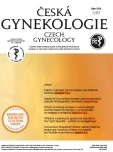-
Medical journals
- Career
Surrogate motherhood: the contradicitons in terminology
Authors: H. Hobzová
Authors‘ workplace: Ústav lékařské etiky LF MU, Brno, přednosta doc. Mgr. J. Kuře, Dr. phil.
Published in: Ceska Gynekol 2018; 83(6): 464-467
Category:
Overview
Objective:
The aim of this article is to give a critical overview of the main concepts used in surrogate motherhood, taking into account the influence of some terms, such as the commissioning parents, commercial surrogacy or the phrase „gift of life“, on a specific framework of interpretation of this reproductive model. Partial interest is to compare the findings with the results of foreign studies and propose alternative concepts suitable for scientific and political discourse in the Czech Republic.
Design:
Review.
Setting:
Department od Medical Ethics, Faculty of Medicine, Masaryk University, Brno.
Methods:
Summary of texts on surrogacy motherhood, published in the years 1986–2017 in the Czech Republic, taking into account the terminology used by the surrogacy. Comparison with foreign studies.
Conclusion:
Terminology of surrogacy has its ethical and psychosocial consequences. In some cases, the terms implicitly include the attitudes of the authors. It is preferable to use preferential terms of surrogacy, surrogate mother. The use of the notion of commissioning parents becomes unacceptable. The use of the terms of intended parents is more correct, respecting the autonomy of the persons involved. The terms „commercial surrogate motherhood“ and „gift of life“ should be further discussed.
Keywords
surrogacy, surrogate mother, intended parents
Sources
1. Beeson, D., Darnovsky, M., Lippman, A. What‘s in a name? Variations in terminology of third-party reproduction. RBM online, 2015, 31(6), p. 805–814.
2. Brunet, L., King, D., Davaki, K., et al. Comparative study on the regime of surrogacy in the EU member states. European Parliament. 2013 [cit. 2018-04-19] Dostupné na: http://www.europarl.europa.eu/thinktank/en/document.html?reference=IPOL-JURI_ET(2013)474403, 382 p.
3. Berend, Z. The social context for surrogates‘ motivations and satisfaction. RBM online, 2014, 29(4), p. 399–401.
4. Císařová, D., Sovová, O. Náhradní mateřství v právní praxi. Časopis zdravotnického práva a bioetiky, 2015, 5(2), s. 13–24.
5. Fairclough, N. Analysing discourse: textual analysis for social research. London, Routledge, 2003. 270 p.
6. Haderka, JF. Surogační mateřství. Právný Obzor: teoretický časopis pre otázky štátu a práva, 1986, 69(10), s. 917–934.
7. Honzák, R. Děloha na leasing a proč jsem proti. Vesmír, 2010, 89(1), s. 14–15.
8. Jílek, A. Hraniční kameny náhradního mateřství: 1. část. Gynekolog, 2014, 23(4), s. 165–171.
9. Konečná, H. Analýza regulace věkových limitů přístupu k asistované reprodukci a regulace tzv. náhradního mateřství. 2015 [cit. 2018-04-19] Dostupné na http://www.adamcr.cz/soubory/Analyza_prosinec21_2015_celek_vek_NM.pdf, 38 s.
10. Kukla, L. Sociální a preventivní pediatrie v současném pojetí. Praha: Grada, 2016, 456 s.
11. Mitlöhner, M. Některá trestněprávní rizika náhradního mateřství. Rodinné Listy, 2017, 6(4–5), s. 11–14.
12. Nožířová, J. Náhradní rodinná péče. Praha: Linde, 2012, 94 s.
13. Pande, A. Transnational commercial surrogacy in India: gifts for global sisters? RBM online, 2011, 23(5), s. 618–625.
14. Pande, A. Blood, sweat and dummy tummies: Kin labour and transnational surrogacy in India. Anthropologica, 2015, 57(1), p. 53–62.
15. Pektorová, M. Surogace, ano či ne? Čes Gynek, 2015, 80(4), s. 299–301.
16. Permanent Bureau. A preliminary report on the issues arising from international Surrogacy Arrangements. Hague Conference of Private International Law, 2012. [cit. 2018–04-19] Dostupné na https://assets.hcch.net/docs/d4ff8ecd-f747-46da-86c3-61074e9b17fe.pdf, 33 p.
17. Pilka, L., et al. Surogátní mateřství – literární názory a praxe. Čes Gynek, 2009, 74(2), s. 144–147.
18. Seguin, E. Narration and legitimation: the case of in vitro fertilization. Discourse & Society, 2001, 12(2), p. 195–215.
19. Shenfield, F., Pennings, G., Cohen, J., et al. ESHRE Task Force on Ethics and Law 10: surrogacy. Hum Reprod, 2005, 20(10), p. 2705–2707.
20. Smolíková, K. Institut matky hostitelky. Zdravotnictví a právo, 2009, 13, 11, s. 6–9.
21. Stanovisko Etické komise Ministerstva zdravotnictví k některým otázkám asistované reprodukce, 2017, [cit. 2018-04-19] Dostupné na https://www.mzcr.cz/dokumenty/stanovisko-eticke-komise-ministerstva-zdravotnictvi-k-nekterym-otazkam-asistovan_13839_3359_1.html, 4 s.
22. Valc, J. Asistovaná reprodukce a její vliv na právní status (nad)počatého embrya či dospívajícího dítěte. Čas Zdravot Práva Bioetiky, 2017, 7(3), s. 18–38.
23. Vondráček, L., Vondráček, J., Dvořáková, V. Pronájem dělohy – náhradní mateřství. Zdravotnictví v České Republice, 2009, 12(3), s. 119–120.
Labels
Paediatric gynaecology Gynaecology and obstetrics Reproduction medicine
Article was published inCzech Gynaecology

2018 Issue 6-
All articles in this issue
- The effect of myomectomy on the morphology uterine and tubal factor of infertility
- Radiofrequency endometrial ablation – new possibility of heavy menstrual bleeding conservative treatment
- Perinatal mortality and morbidity in Slovak Republic in the years 2007–2015
- Asherman‘s syndrome: the description of two case reports
- Fetal and neonatal alloimmune thrombocytopenia
- New potential biomarkers for preeclampsia prediction
- Surrogate motherhood: the contradicitons in terminology
- Etiology, risk factors, and methods of postpartum depression prevention
- Ectopic pregnancies: a retrospective cohort analysis in a tertiary reference center in the Northeast Region of Brazil
- Gynecological tumor triplicity
- Strumal carcinoid of the ovary – report of two cases and review of literature
- Czech Gynaecology
- Journal archive
- Current issue
- Online only
- About the journal
Most read in this issue- Etiology, risk factors, and methods of postpartum depression prevention
- Radiofrequency endometrial ablation – new possibility of heavy menstrual bleeding conservative treatment
- Asherman‘s syndrome: the description of two case reports
- Perinatal mortality and morbidity in Slovak Republic in the years 2007–2015
Login#ADS_BOTTOM_SCRIPTS#Forgotten passwordEnter the email address that you registered with. We will send you instructions on how to set a new password.
- Career

